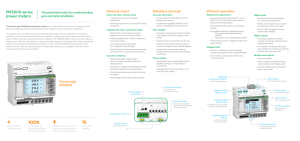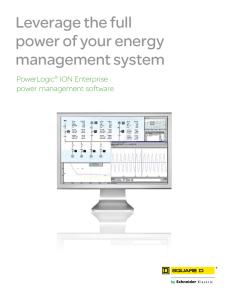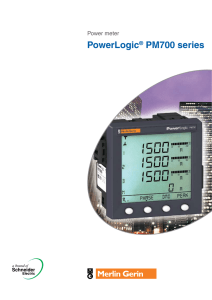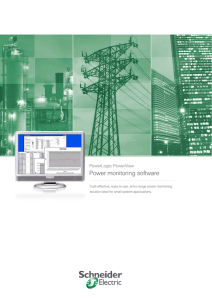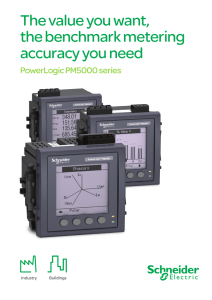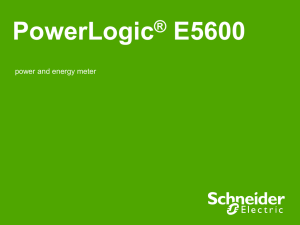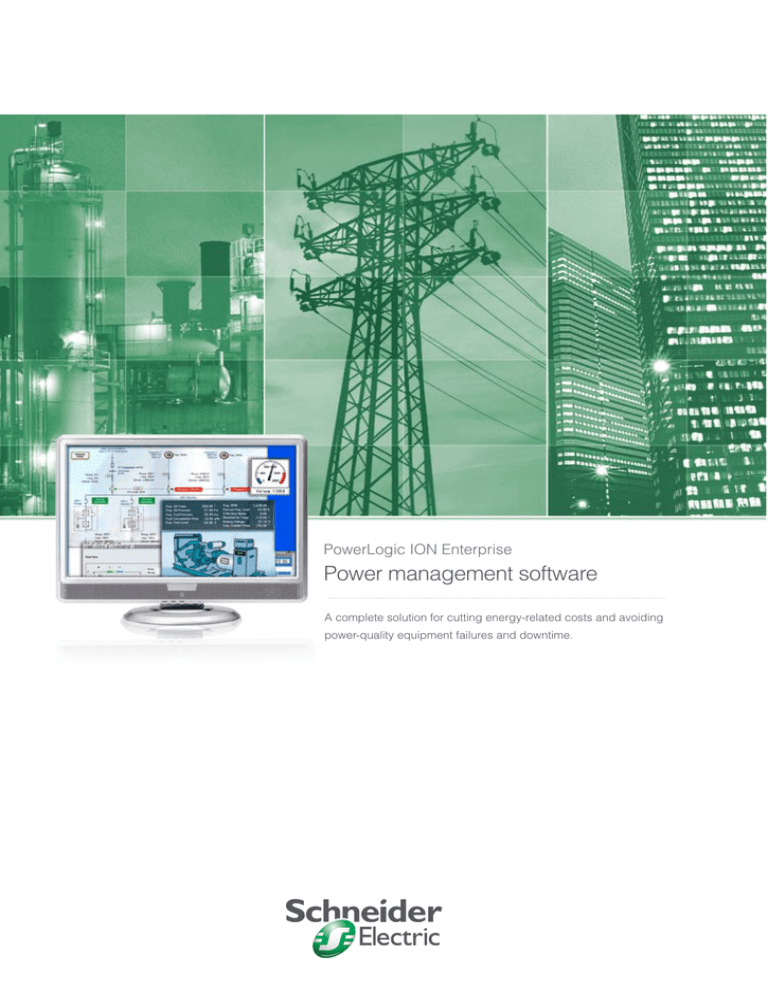
PowerLogic ION Enterprise
Power management software
A complete solution for cutting energy-related costs and avoiding
power-quality equipment failures and downtime.
Manage real-time power conditions and energy efficiency
PowerLogic ION Enterprise software is a complete power management
solution for energy providers and industrial or commercial operations. It
gives engineering and management personnel the information they need
to cut energy-related costs, avoid downtime and optimise equipment
utilisation. The software uses a choice of industry-standard network
technologies, including Ethernet and wireless, to automatically collect and
store data from key electrical distribution points and physical assets. It forms
a layer of energy intelligence across your facility, campus, service area or
your entire enterprise, acting as a unified interface to electricity and other
consumable resources such as water, compressed air, gas and steam.
Web-enabled access gives each user a personalised view to timely, relevant
information.
PowerLogic ION Enterprise helps you track real-time power conditions,
analyse power quality and reliability, and respond quickly to alarms to avoid
critical situations. It helps you study historical trends to reveal energy waste
or unused capacity as well as verify efficiency improvements and allocate
costs to buildings, departments or processes. The software includes
sophisticated load aggregation and arithmetic calculation. Coordinated
control capabilities can be used to manage demand or power factor and to
manage loads or generators. Customised information is easily seamlessly
shared with all stakeholders and with other business and automation
systems.
Typical application
Real-time display of data
Alarms and control
functions
Power quality
analyses
Historical trend
analyses
Customised
reporting
Corporate network
Incoming power feeds and
on-site generation
Switching and mitigation
equipment
Power distribution
equipment
Loads, processes
or tenants
Typical applications
For infrastructure, industrials and buildings
Financial management including
accounting and billing
v Energy savings
v Measure efficiency, reveal opportunities and verify savings
v Sub-bill tenants for energy costs
v Allocate energy costs to departments or processes
v Reduce peak demand surcharges
Facility and energy management
v Reduce power factor penalties
v Strengthen rate negotiation with energy suppliers
v Enable participation in load curtailment programs (e.g. demand response)
v Identify billing discrepancies
v Leverage existing infrastructure capacity and avoid over-building
Operations management including
engineering, planning and maintenance
v Support proactive maintenance to prolong asset life
v Energy availability and reliability
v Validate that power quality complies with the energy contract
v Verify the reliable operation of equipment
v Improve response to power quality-related problems
v Optimise system relay coordination
Power generation, transmission
and distribution
For electric utilities
v Energy availability and reliability
v Improve T&D network reliability
v Enhance substation automation to reduce field service time
v Maximise the use of existing infrastructure
v Power quality
Service entrances and onsite generation
v Verify compliance with new power quality standards
v Analyse and isolate the source of power quality problems
Key features
Integrated network comprising corporate intranet, Internet, serial, dial-up or wireless connections
Power mitigation and main power
distribution equipment
PDUs and data servers
v Scalable, flexible architecture: grow your system to hundreds of metering points;
add distributed servers and clients; use ION modular programming for
complex data processing and control functions
v Data acquisition: eliminate manual meter reading by collecting system-wide data
from PowerLogic energy meters, MicroLogic breaker control units and third-party
water, air, gas, electricity or steam (“WAGES”) meters, as well as from power
distribution or mitigation equipment web services; communicate over Internet,
Ethernet, wireless and other methods
v Interoperability: share data with third-party SCADA, automation and business
systems; compliant with ODBC, OPC and PQDIF standards
v Web portal: multi-user access to customised graphical views of system diagrams,
real-time and historical data, status indicators and alarm messages; multi-level
security
v Reporting: preconfigured and custom reports; support for Microsoft Excel and
other third-party reporting tools; scheduled distribution via email or web
v Trending: graph any combination of measured parameters; aggregate loads
Tenants, departments or subcontractors
v Power quality analysis: wide-area event monitoring and plotting (ITIC, SEMI);
power quality compliance monitoring and reporting to international standards
(IEC 61000-4-30, EN50160); waveform viewer; harmonics, K-factor, crest factor,
and symmetrical components measurements
v Alarms and events: trigger on complex conditions; generate alarm notifications;
log all relevant event data
Processes, lines, machines or equipment
Typical applications of PowerLogic ION Enterprise within a
PowerLogic power and energy management system
v Control: manual or setpoint-triggered control functions; coordinated control of
multiple loads, generators, relays or other power distribution and mitigation
equipment
Software architecture
WWW
Data presentation
v Enterprise-wide, multi-user data and control access through local server
interface, thin-client web browser, or terminal services; tiered security
v Information and alerts via mobile phone, PDA and other devices
10:46
November
Data presentation
Functional components
Functional components (on main server or workstations)
v Management Console – configure your PowerLogic ION Enterprise
network, including communication paths, devices and logical groups.
v Designer – customise the modular functionality of ION devices and
Virtual Processors (see below)
v Vista – real-time displays of measurements and status indicators,
power quality analysis, historical trending, alarms and manual control
v Reporter – predefined or custom reports; support for third-party
reporting tools
Data acquisition and management
Data acquisition and management
v Virtual Processor - multi-site aggregation, coordinated control,
complex calculations and alarming, logging for non-recording
devices (e.g. interval kWh)
v Site Server - continuous or scheduled retrieval of data from up to
hundreds of remote devices over Internet, Ethernet, telephone, serial,
wireless, or satellite connections
v SQL ODBC-compliant databases - Microsoft SQL Server 2005 (with
support of SQL Server 2000). Log device data, system data and events
with accurate meter synchronisation (±16 ms or ±1 ms using GPS) for
precise event timestamping, power quality analysis and revenue billing;
data is securely accessible using industry-standard database tools; add
distributed databases and servers as required for load balancing
v OPC DA Client (standard), OPC DA Server (optional) and PQDIF Exporter
(optional) – supports data import/export with compliant devices and
systems
Data acquisition and integration
v Integrate metering of electricity and other
consumed services such as gas, steam, air,
and water.
v Standard product offers native support for
PowerLogic ION series, PM800 series, PM700
series, PM210 and legacy ACM series power
and energy meters. Enables access to all
real-time and logged data, control of on-board
relays and digital outputs, remote configuration
and firmware upgrading. Also supports data
access from MicroLogic circuit breaker control
units (types A, P and H).
v Easily customised to add support for third-party
meters, transducers, PLCs, RTUs and power
distribution or mitigation equipment. Quickly
add and configure direct communications
with remote devices over Modbus RTU or
Modbus TCP protocols using easy-to-use
device templates. Or connect the outputs of
transducers or other devices to the digital and
analog inputs of PowerLogic meters.
v Use MeterM@il® encrypted email messaging to
securely access meter data over the Internet
within firewall restrictions.
Connect to meters, sensors, controllers, web services and other systems.
Extract values from spreadsheets to combine with dynamic power and energy calculations.
v Scalable platform enables remote devices and
user clients to be added as needs grow while
maintaining your original investment.
v Integrate with other energy management or
automation systems (e.g. SCADA, BAC, DCS,
ERP) through ODBC, XML, OPC, email, FTP,
CSV and PQDIF compliance; integrate with
web services through XML.
Real-time monitoring
v View key distribution points across one or more facilities or substations,
accessible from any workstation, locally or around the world.
v Display real-time power and energy measurements, historical trends
and data logs, alarm conditions, equipment status (on/off, temperature,
pressure, etc.), control triggers and analysis tools.
v Use the Virtual Processor to perform sophisticated data computations,
then display and log derived values.
v Select pre-configured diagrams or easily create customised views
comprising digital readouts, dials, bar or trend graphs, one-line or
elevation diagrams, maps, photos and animation.
v Set up hyperlinks between diagrams, then use easy point-and-click
navigation to reveal deeper layers of detail, e.g. start with a site overview,
click once to reveal a feeder, click again to see a disturbance analysis.
Desktop access to power system information from any department, building
or region. Graphical views of relevant, actionable information customized
for each user.
v Group relevant measurements, indicators and controls into a library of
convenient views.
v Easily extract and analyse selected ranges of information from the
database using a query wizard.
Reporting
v Reports can be generated manually, on schedule or event-driven.
Distribute automatically as email or HTML.
v Standard reports:
v Generate reports through Microsoft Excel using a fast and convenient
report wizard interface.
v Aggregate energy and demand reports – combines multiple feeds,
costs for each tariff period over requested intervals, matched to utility
billing structures, with multi-year scheduling and time-of-use activity
profiles.
v Aggregate load profile reports – system-wide usage patterns over the
specified date range, including timestamps and peak usage.
v IEC 61000-4-30 and EN50160 compliance reports – pass/fail indicators
help you quickly assess system power quality levels, including flicker.
v Power quality analysis reports – disturbance waveforms, voltage
tolerance curves, and harmonic histograms.
v Custom reports:
Allocate costs, consolidate billing or negotiate contract volume pricing. Assure
compliance with PQ standards and verify the results of operational improvements.
v Use Visual Basic for Applications or any off-the-shelf SQL Server
reporting tools, such as Crystal Reports, to customise reports and
enable further analysis.
v Combine PowerLogic ION Enterprise data with other databases to
reveal true business conditions.
v Our services team can help you with custom report development.
Trend analysis
v Generate one or more trend graph overlays for interpretation of data using
simple visual analyses.
v Trend on any measured parameter: voltage, current, power, power factor,
demand, predicted demand, energy, harmonics, temperature, etc.
v Graph aggregate load profiles from multiple metering points or compare
related parameters from across your enterprise.
v Create usage profiles to reveal demand peaks, dangerous trends, or
unused capacity.
Support load studies or expansion planning, optimise equipment use by
maximising capacity or balancing loads. Reveal critical trends, expensive
processes or energy waste.
v Track system-wide energy-related costs for each building, feeder, process
or tool.
Power quality analysis
v Continuous, wide-area monitoring, data capture and reporting for power
quality and reliability conditions.
v IEC 61000-4-30 and EN50160 compliance reporting verifies power quality
performance to international standards. Quickly review power quality
indices as numeric charts or graphic profiles. Requires PowerLogic
ION7650 meters or other devices that support compliance monitoring.
v Display harmonic histograms, odd/even harmonics, THD, K-factor, crest
factor, phasor diagrams and symmetrical components.
v Plot waveforms of up to many seconds in duration, with overlays that
correlate phase-to-phase relationships between voltages, currents and
cascading failures.
v Plot sags, swells, short duration transients and other disturbance events
on industry-standard voltage tolerance curves, including ITIC (CBEMA)
and SEMI.
v For any event, display a list of associated time-stamped incidents, then
click on any incident to see more detailed information.
v Supports a wide range of applications:
v Diagnose and isolate the cause of power quality-related equipment
or process problems.
v Proactively assess current power quality conditions and trends.
Minimise equipment damage and downtime by pinpointing the source of
disturbances, verifying the effect of system upgrades, and validating compliance
with power quality standards.
v Identify equipment vulnerabilities and verify reliable operation of power
distribution and mitigation equipment.
v Benchmark power quality performance and compare service areas,
facilities or processes.
v Set a performance baseline and verify the results of system changes or
equipment upgrades.
Patented ION technology
v PowerLogic ION Enterprise and a variety of PowerLogic ION metering
products feature the unique ION architecture.
v Modular, flexible architecture offers extensive customisation of functionality
using a simple “building block” approach.
v Uniquely addresses advanced monitoring and control applications.
v Adapts to changing needs, avoiding obsolescence.
Use drag-and-drop icons to quickly create customised ION metering, logging or
control functionality within your software or hardware.
Alarms and events
v Receive alerts to outages or impending problems that could lead to
equipment stress, failures or downtime.
v Configure alarms to trigger on power quality events, power thresholds or
equipment conditions.
v Meter-based alarms are immediately pushed to the software without
waiting for system polls.
v Annunciate alarms through operator workstations, email, mobile phone
or PDA using messages customised for the task.
v Configure the combinational logic of the Virtual Processor to trigger on
complex or summary conditions and automatically send out notifications,
upload all associated event data and generate a report.
Respond to a notification, then click an on-screen indicator to retrieve the time,
location, and nature of the event. Click again to study waveforms, tolerance
curves or a report.
v Log complete information on an event, including related coincident
conditions and waveform captures, all with accurate timestamps.
v Correlate and categorise sequences of events.
v Schedule maintenance based on operating history, events and alarms.
Manual and automated control
v Perform fast, manual control operations by clicking on-screen trigger
buttons; operate remote breakers, relays and other power distribution and
mitigation equipment
v Use the Virtual Processor to perform automated control over distributed
equipment:
v Gathers data from multiple devices and incorporates process variables
v Initiates automatic, coordinated control actions if predefined thresholds
are exceeded
v Supports a wide range of applications:
v Shed loads or start up peak-shaving generators in response to
interruptible rates, real-time pricing, or to avoid setting a new peak
demand
v Manage distributed generation assets
Control loads, generation, and power quality mitigation equipment across your
enterprise or service area. Optimise switching with the latest status and base
loading data.
v Control capacitor banks to correct power factor, improve energy
efficiency and avoid penalties
v Start fans to prevent transformer overheating if total harmonic distortion
is too high
Features
Standard
Optional
Automated data acquisition from sites/devices
SQL 2005 Express Edition database
SQL 2005 Standard Edition database
Web-enabled real-time monitoring
Reporting
Trend analysis
Power quality analysis, compliance reporting
“The 2007 award recognizes Schneider Electric for its technological
advancements and wide product range in the field of power quality (PQ) and
energy management solutions. In total, this is the fourth award that
Schneider Electric and [recently acquired] Power Measurement have received
from Frost & Sullivan in recognition of achievements in this arena.”
Prithvi Raj, Frost & Sullivan research analyst
Alarms and events
Manual and automated control
OPC DA client
OPC DA server
PQDIF data export
Supported devices
PowerLogic power and
energy meters:
Power Measurement legacy power
and energy meters:
ION8800
ION8500/8400/8300
ION8600
ION7700
ION7650/7550 series
ION7600/7500 series
PM800 series
ACM3720
ION7300 series
ACM3710
PM710, PM750
ACM3300
Power Measurement and its ION products were recently acquired by
Schneider Electric and integrated within our PowerLogic range of software
and hardware, creating the world’s largest line of power and energy
management solutions.
ION6200
Circuit breaker control units:
Other:
MicroLogic, Type A, P and H
Modbus-compatible devices
Other devices through OPC
System requirements
Please consult your local Schneider Electric representative for complete system
requirements and commissioning information for PowerLogic ION Enterprise. The
following are minimum requirements to support 1 to 25 meters with factory default
settings.
Server hardware: CPU requirements are dependent on number of devices and clients
to be supported; minimum is 2 GHz CPU, 1 GB RAM, 40 GB disk drive, CDROM drive
and Ethernet port. For applications with a single primary server and single client,
server can run Windows XP Professional. For larger systems primary server requires
32-bit Windows Server 2003 certified (see Microsoft website). Use of secondary
servers is also supported.
Server software: Microsoft Office 2003 Suite, Microsoft Windows IIS
(Internet Information Services)
Client software requirements: 32-bit Windows XP Professional
or Windows Server 2003, Microsoft Office 2003 Suite
Modem support: For dial-up connections, supports any modem compatible with the
WinModem standard.
Schneider Electric Industries SAS
89, boulevard Franklin Roosevelt
F - 92500 Rueil-Malmaison (France)
tél : +33 (0)1 41 29 85 00
www.powerlogic.com
www.schneider-electric.com
PLSED106018EN
01-2008
Please contact your local sales representative for
ordering information.
Visit www.powerlogic.com for more information
on other PowerLogic products, applications and
system solutions.
ART 821272 / © 2008 - Schneider Electric - All rights reserved
PM210
As standards, specifications and designs develop over
time, always ask for confirmation of the information
given in this publication. PowerLogic, ION, ION Enterprise, MeterM@il and Modbus are either trademarks or
registered trademarks of Schneider Electric.
Printed on recycled paper
Publishing : Schneider Electric
Production : Schneider Electric PMC
Printing : Imprimerie du Pont de Claix - made in France

